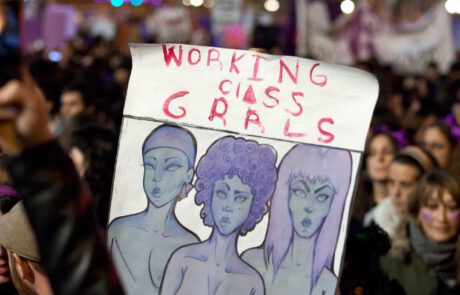Domestic territories, indigenous, peasant and communitarian territories, the territories of precarious, popular, migrant and unregulated work have usually remained outside of what is recognized as “work”, and therefore outside of union organization, subordinated and invisibilized by paid work of white males. We return to the feminist question “What is your strike?” which allows us to look beyond the boundaries between production and reproduction, imagining new relationships between syndicalism and community.
In recent years, the transnational feminist movement has adopted the struggle against debt as one of its causes. In different geographies we have shouted, “We want to be alive, free and without debt! Us against debt! They owe us a life! We don’t owe, we won’t pay!” We propose to survey and map the struggles against financial extractivism in different territories and seek the connections between them, from processes of urbanization in the peripheries of Buenos Aires to the fight against evictions in Madrid, including the stripping down of public services and the growth of public and private debt.
In recent years the feminist movement has put the crisis of social reproduction massively and radically on the political stage, both as a civilizational crisis and as a crisis of the patriarchal structure of society. The fascist impulse has reacted against these forces of destabilization, proposing economies of obedience to channel the crisis. In this context, feminism — as a force capable of acting at the seam between neoliberalism and fascism— also enters into dispute. We propose to map transnationally the forms this counteroffensive is taking, in order to diagnose and conceptualize the alliance between neoliberalism and conservative forces.
“Ni una menos!” was the first cry that shook the planet, activating a new feminist energy at a global scale. The politization of the patriarchal war against women and gender non-conforming people has gone hand in hand with the visibilisation of this violence’s intersectionality with other forms of economic and colonial violence. After some first attempts at escraches as a self-organized method of marking and visibilizing acts of violence, a debate has opened up over forms of feminist justice that go beyond punitivism, led by feminist groups involved in the struggle against the prison industry as well as communitarian feminisms.
Popular feminist struggles have continuously placed care work and the daily sustaining of life at the center, as a dynamic for surviving crisis but also as a practice that builds bonds and alliances, as a source of resistance against extractivist dynamics, and as a logic opposed to the logic of profit accumulation. As soon as we recognize that exploitation and the fight against it do not take place solely in the field of paid work but also, and especially, in social reproduction – the society itself – and in natural and human ecosystems, the battlefield broadens to include hitherto invisibilized spaces.
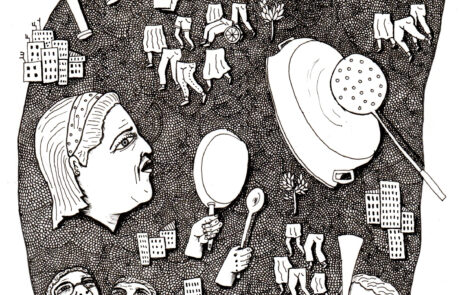
Until the Patriarchy Falls and There Are No More Evictions. Chapters 3 to 6
Here you'll find chapters 3 to 6 of "Until the Patriarchy Falls and There Are No More Evictions. Debt, Housing and Patriarchal Violence", written by Myrian Espinoza Minda and Lotta Meri Pirita Tenhunen in dialogue with PAH Vallekas' Women's Group, illustrated by Coco Guzmán and now translated by Liz Mason-Deese. The research and writing process of the booklet were funded by the Rosa-Luxemburg-Stiftung, Madrid Liaison Office [...]
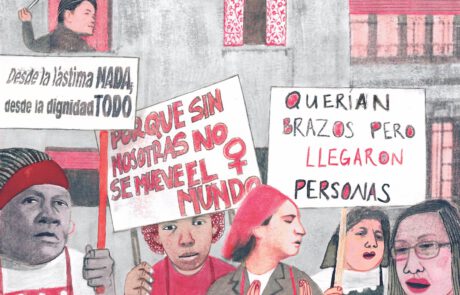
Bio-syndicalism from the Domestic Territories. An Introductory Selection
Here you'll find an introductory selection of the five main chapters of "Bio-syndicalism from the Domestic Territories. Our Reclaims and Our Ways of Doing", written by Rafaela Pimentel Lara, Costanza Cisneros Sánchez, Amalia Caballero Richard and Ana Rojo Delgado in dialogue with Territorio Doméstico, illustrated by Ana Peñas and now translated by Liz Mason-Deese. The research and writing process of the booklet were funded by the [...]
La Laboratoria. Our Origin, Our Story
La Laboratoria was born in 2020 in the heat of the international feminist tide, through the fabric of ongoing conversations among feminist activist and thinkers from Latin America, North Africa and Europe focused on situated knowledge and artist production within feminist grassroots. Since we began our journey, we have articulated our work around three main lines of action – situated feminist research & co-creation practices, feminist [...]
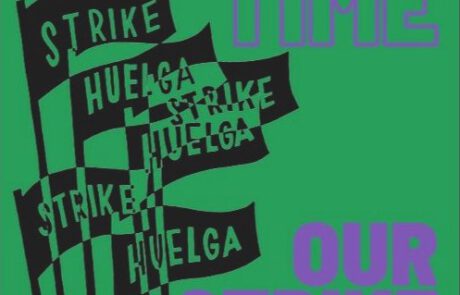
Our Time/Our Strike. Tools for Thinking and Mapping the Feminist Strike
"We—women, trans, queer folks, feminized bodies and subjects— already, in our everyday lives, make time multiply, we cook, we clean, we care, we teach, we think, we write, all at the same time. It is not only that we have multiple working days—the work outside the home (which of course is now inside of the home for many of us), the work in the home, the [...]
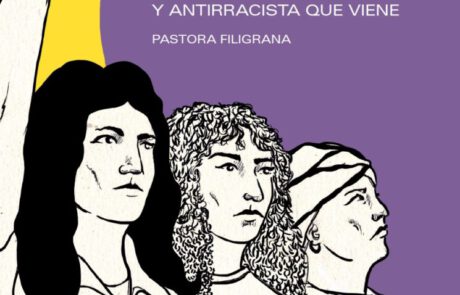
Introduction to «From Farm-Work to Care-Work. Towards a Feminist and Anti-racist Syndicalism»
This is the introductory text to “Del campo a los cuidados. El sindicalismo feminista y antirracista que viene”, published by the La Laboratoria, with support of the Rosa Luxemburg Foundation Madrid and Foundation for Arts Initiatives. It was translated into English for Common Ecologies and the MovE research project, by Maggie Schmitt from Zenobia translations. Illustrations by Cynthia Veneno. Deregulation, new and old The old unionist [...]

Criminalization of Pregnancy. A War on Reproduction
By Feminist Research on Violence Platform Elizabeth Downer, Susana Draper, Alejandra Estigarribia, Silvia Federici, Anna Fox, Lewanne Jones, Jesal Kapadia, Belén Marco-Crespo, Alice Markham-Cantor, and Begonia Santa-Cecilia We created this pamphlet in order to analyze the forms of criminalization of pregnancy that have been reinforced in recent decades in the United States as one of the forms of war against women in the field [...]



